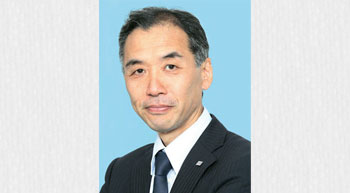Tomohiko Okada, MD, Toshiba India Pvt Ltd, says Indian Railways´ modernisation plans are opening up new areas of opportunities for cutting-edge technology solutions.
What is the focus of Toshiba´s railways division in India?
We would like to contribute to the growth and development of rail transportation in India through our experience and capabilities acquired by delivering projects globally. While we have the experience and capability to deliver on a wide array of transportation projects, we would be focusing more on the supply of rolling stock systems.
India is all set to grow and is already being projected as the growth engine for the global economy which, certainly, calls for robust infrastructure. Usually, railways form an essential element of the infrastructure in most countries and it is all the more important in India where Indian Railways has the potential to not only meet the global sentiment but significantly stimulate its own growth.
The current government is also appearing to be taking necessary steps in that direction by expediting projects like dedicated freight corridors, high speed rail projects, etc., which are going to open up new areas of opportunities for a company like Toshiba.
What are your expectations on the requirement of Indian Railways for the products you are going to manufacture at your new facility in Hyderabad?
Considering IR´s plans for capacity building and modernisation of their rolling stock, there are opportunities in abundance for which our manufacturing facility is aligned. We plan to manufacture propulsion equipment in our new facility. These have got applications on various kinds of rolling stock. With the kind of focus Railways Ministry is putting on bringing new-age technology on their rolling stock, we believe Toshiba will have many opportunities in the Indian market.
We fully understand that there are already established suppliers to IR for its requirements on existing products for rolling stock systems. However, IR´s initiatives like capacity building and modernisation are going to generate additional requirements for new-age technology solutions. We would like to offer the cutting-edge technology we possess and our reliable product range.
Are you particularly focused on the opportunities thrown up by the metro projects or the main line railways (long-distance trains)?
We have the experience and capability to deliver on both so we shall be focussing on IR as well as metro. In fact, we are currently working on a couple of both IR and metro projects through our partners. Toshiba has the global experience of delivering on projects for both areas and we intend to replicate the same in India too. That is the reason why we have come up with a plan to invest in a facility in India considering the growth potential of this market and our capability to deliver for it. For example, we developed rolling stock products for mainline locomotives as well as for metro trains for the Chinese market when China opened up to foreign technology and investment. Toshiba also invested in a facility in China to deliver its localised product to the Chinese market. Hence, we would like to repeat the success story again in India as well.
What is your expertise in Railways and which markets/countries do you already serve?
Toshiba´s transportation business covers a wide spectrum of activities from supply of locomotives, rolling stock systems, power supply systems, information systems, high speed railways, LRT, electric bus and EPC project capabilities.
We serve global markets, to name a few, like China, Taiwan, South Korea, Thailand, Malaysia, Indonesia, South Africa, Brazil, Australia, Ireland and America, and our home country, Japan.
Depending on the requirements of the market and suitability of a project, we have serviced markets with a mix of products and solutions. For example, we have delivered the high-speed rail project in Taiwan but also supplied locomotives in South Africa. We have supplied rolling stock systems for locomotives and metro projects in China in a big way in the last decade. Even for the Indian market, we have already started delivering Toshiba HVAC system on rolling stock (RS10) for DMRC, supplied by Hyundai Rotem. It entirely depends on the market demand and project specification which we evaluate on merit before we decide to participate or take up for execution.
What is the difference you have seen in IR in the last two years, if any, since the current government took over?
IR appears to be more committed in their effort to deliver on their vision to turn around the railways as the growth engine for the economy. First, there was a delegation of power to the zonal railways and production units to decide their own procurement requirements for any size and volume. Earlier, all high-value tenders (more than Rs 75 crore) were being decided solely at the level of the ministry. Thereafter, in respective budgets in the last two years, there have been several other measures adopted by Indian Railways. For instance, the sourcing of funds or project execution methods is giving a lot of confidence to investors and the industry, as a whole. The decision on PPP project for locomotives has been a great push to project IR as an organisation determined to bring about change.



Leave a Reply
You must be logged in to post a comment.